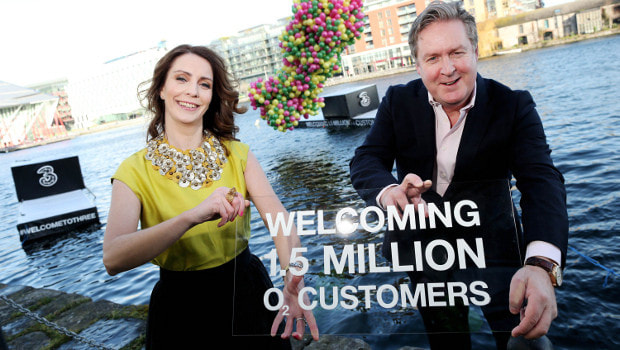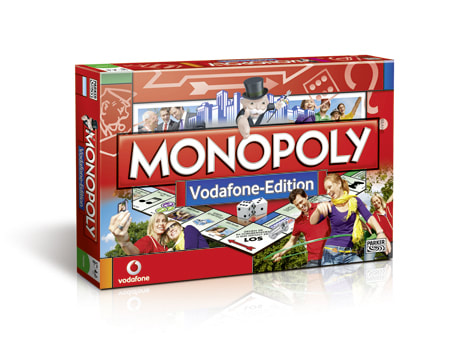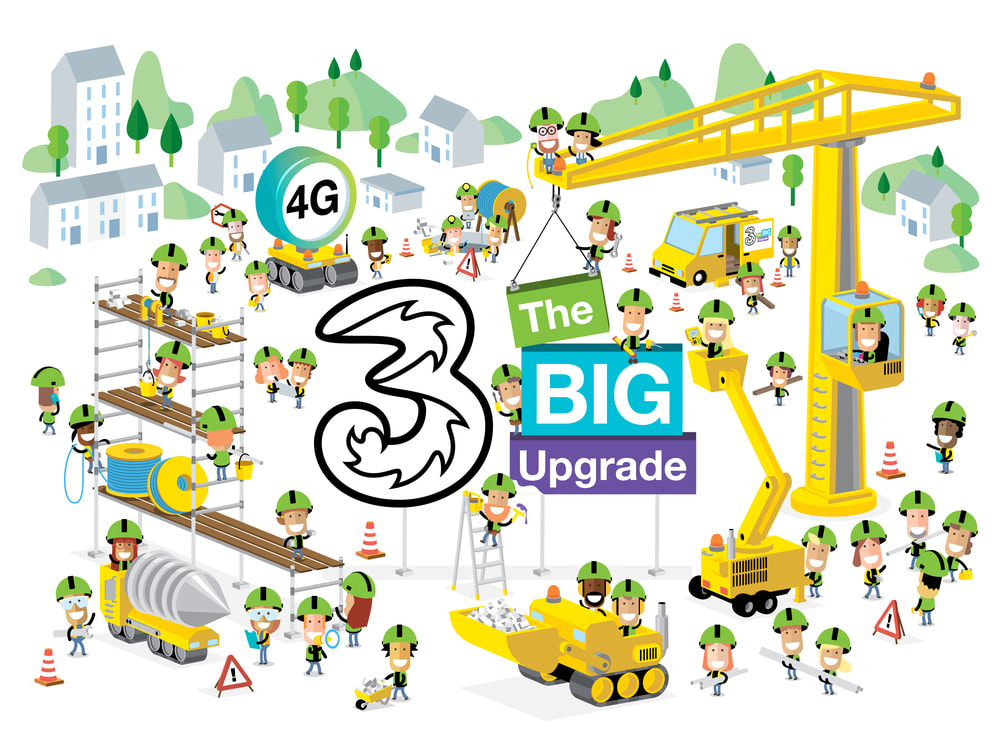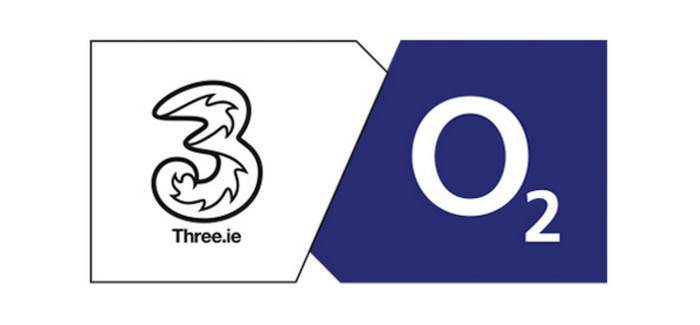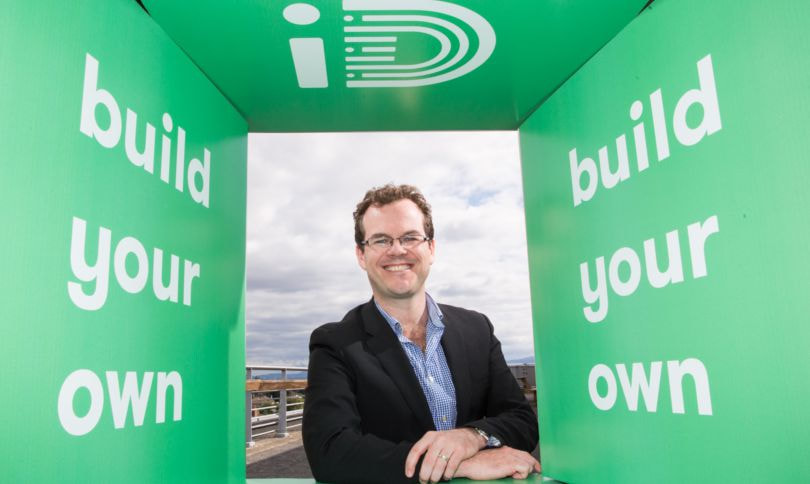Was The Three-O2 Merger a Mistake?
There are now only three mobile networks in Ireland, has that hindered competition?
Published 07/07/18
Recently, reports have emerged suggesting that the takeover of Telefónica's O2 in Ireland by Three was a mistake on behalf of European competition authorities. In a vacuum, that would be true. Since the consolidation of the two networks, prices have risen across virtually all pay as you go and bill pay plans. However, that's not the full story because a mobile network is more than just the price of its plans.
The merger of Three and O2 has brought significantly more competition to Ireland's largest mobile network, Vodafone. Big Red ruled the Irish market by quite a significant margin for many years. Now, Three's customer base is similar in size to that of Vodafone's. The merger has compelled Vodafone to overhaul its dated plans and offer customers more data than ever before without raising prices. It's also possible that Vodafone's network investment in Ireland may have been less significant if the company knew the merger would be blocked. It's no wonder Vodafone made efforts to block the merger.
Three now has over two million customers, a full one million customers more than that of Eir. The merger meant that Three leapfrogged Eir, pushing the company to streamline its mobile offering. Since the merger, increased competition has forced Eir to embark on a rebranding saga, abolishing Meteor Mobile and changing the name to Eir. The death of Meteor can be attributed, in some way, to the rise of Three. Eir, like Vodafone, has also had to be nicer to its customers. The network now provides significantly more data across all of its plans and prices remain steady.
The merger of Three and O2 has brought significantly more competition to Ireland's largest mobile network, Vodafone. Big Red ruled the Irish market by quite a significant margin for many years. Now, Three's customer base is similar in size to that of Vodafone's. The merger has compelled Vodafone to overhaul its dated plans and offer customers more data than ever before without raising prices. It's also possible that Vodafone's network investment in Ireland may have been less significant if the company knew the merger would be blocked. It's no wonder Vodafone made efforts to block the merger.
Three now has over two million customers, a full one million customers more than that of Eir. The merger meant that Three leapfrogged Eir, pushing the company to streamline its mobile offering. Since the merger, increased competition has forced Eir to embark on a rebranding saga, abolishing Meteor Mobile and changing the name to Eir. The death of Meteor can be attributed, in some way, to the rise of Three. Eir, like Vodafone, has also had to be nicer to its customers. The network now provides significantly more data across all of its plans and prices remain steady.
Investing in a brighter future
|
Following the merger, Three's combined network with O2 was a complete mess. O2 neglected its customers and didn't launch a 4G network. Three's own network was limited in coverage. When O2 customers were suddenly given access to unlimited data, the networks collapsed. There were months of outages and capacity shortages. If you were a Three or O2 customer, it was very unpleasant and outright unfair. At the same time, Vodafone pushed ahead with Project Spring, delivering a state of the art network to its customers. For quite a while, Vodafone's network was years ahead of Three.
|
Three years later, Three's network is no longer the mess it once was. Here is the key point I want to make, the merger has allowed Three to invest significantly more money in the network. With almost three times the number of customers than previously, it gives Three the opportunity to receive more money from Hutchinson. This increased investment benefits everyone in Ireland, not just Three customers.
"The Big Upgrade Programme", a €350 million network upgrade programme, has brought Three's network out of the stone age and flying into the 21st century. Three customers now enjoy a level of service that would be impossible had the merger not taken place. This is thanks in part to the spectrum Three received when it bought O2. Three has the most amount of 4G spectrum of any network in Ireland, that is a big deal. Again, this directly benefits the customer and allows Three to continue offering unlimited data to its customers.
Then there is also the advantage of having more cell sites to choose from. A major part of the "Big Upgrade" programme has been to overhaul the radio access network and the core network. The merger allows Three to essentially choose the best cell sites to serve its customers. Many O2 cell towers have now been decommissioned, creating synergies for Three.
Three's network sure isn't perfect, its still behind Vodafone in virtually every aspect. But the margins between the networks are shrinking, rapidly. The network now has over 900 4G+ sites providing maximum speeds of 400Mbps. I've managed to obtain some more precise coverage data from Three themselves. Three provides over 94% 4G population coverage in Ireland. Three now delivers 94% 4G coverage across Donegal. Three now delivers 93% 4G coverage across Carlow. Three now delivers 99% 4G coverage across Kilkenny. Three now delivers 96% 4G coverage across Louth. Three now delivers 95% 4G coverage across Monaghan.
Vodafone's efforts to block the merger were based upon the fear of Three owning too much spectrum. The EU ensured Three set aside up to 30% of its spectrum for two new MVNO's with the opportunity for them to build out their own network in the future. However, Vodafone claimed that it would be highly unlikely for these MVNO's to ever build out their own network. Guess what, Vodafone was right. One MVNO is no longer and it is highly unlikely that Virgin Mobile will develop its own mobile network. Three now regains control of the 15% spectrum that iD Mobile held, tightening its control of spectrum provided by ComReg.
To conclude, the merger has allowed Three to invest in a network that will support its customer's needs for the near future, taking advantage of new spectrum and operating more cell sites than ever before.
For a more detailed analysis of Three's network, see this article.
"The Big Upgrade Programme", a €350 million network upgrade programme, has brought Three's network out of the stone age and flying into the 21st century. Three customers now enjoy a level of service that would be impossible had the merger not taken place. This is thanks in part to the spectrum Three received when it bought O2. Three has the most amount of 4G spectrum of any network in Ireland, that is a big deal. Again, this directly benefits the customer and allows Three to continue offering unlimited data to its customers.
Then there is also the advantage of having more cell sites to choose from. A major part of the "Big Upgrade" programme has been to overhaul the radio access network and the core network. The merger allows Three to essentially choose the best cell sites to serve its customers. Many O2 cell towers have now been decommissioned, creating synergies for Three.
Three's network sure isn't perfect, its still behind Vodafone in virtually every aspect. But the margins between the networks are shrinking, rapidly. The network now has over 900 4G+ sites providing maximum speeds of 400Mbps. I've managed to obtain some more precise coverage data from Three themselves. Three provides over 94% 4G population coverage in Ireland. Three now delivers 94% 4G coverage across Donegal. Three now delivers 93% 4G coverage across Carlow. Three now delivers 99% 4G coverage across Kilkenny. Three now delivers 96% 4G coverage across Louth. Three now delivers 95% 4G coverage across Monaghan.
Vodafone's efforts to block the merger were based upon the fear of Three owning too much spectrum. The EU ensured Three set aside up to 30% of its spectrum for two new MVNO's with the opportunity for them to build out their own network in the future. However, Vodafone claimed that it would be highly unlikely for these MVNO's to ever build out their own network. Guess what, Vodafone was right. One MVNO is no longer and it is highly unlikely that Virgin Mobile will develop its own mobile network. Three now regains control of the 15% spectrum that iD Mobile held, tightening its control of spectrum provided by ComReg.
To conclude, the merger has allowed Three to invest in a network that will support its customer's needs for the near future, taking advantage of new spectrum and operating more cell sites than ever before.
For a more detailed analysis of Three's network, see this article.
More Data than ever, Cheaper than ever
Looking at the Irish Mobile market today compared to the one before the merger, a few things are very clear. Customers now enjoy more data than ever, at cheaper prices than ever. Three has had a major influence in this, the network has offered all you can eat data as its unique selling point for quite a while now and people love it. Unfortunately, it is very difficult to determine if increased data allowances are a result of increased competition or the ever-evolving trend of larger data allowances. You see, smartphone screens have gotten larger over time and can now stream 4K content which demands more data.
To gain a greater insight into this matter, we need to look to other countries. In this case, Irish data allowances are well above the European average and plan prices are well below the average. This is a telling sign that competition has yielded great benefits for Irish consumers. Comparing the fixed broadband market with Europe, it's clear that ComReg has failed to maintain competition, Irish consumers are amongst the highest spenders on fixed broadband on the continent. We can thank Eir's monopoly for this.
The death of iD Mobile, a Mobile Virtual Network Operator(MVNO), set up by Dixons Carphone Warehouse, also depicts a highly competitive Irish mobile market. iD Mobile made efforts to attract customers by offering large data bundles and flexible plans, but it wasn't enough for customers to abandon their network. iD Mobile went the way of the dinosaur in less than three years, proving a mobile network is more than just the sum of its plans. In fact, Three even capitalised on the death of iD Mobile, bombarding iD Mobile customers with flashy offers to attract them to Three.
Virgin Mobile, set up in 2015 under the conditions of the merger, has grown steadily and now has a 1% share in the Irish mobile market. The MVNO has offered incredibly inexpensive plans for as little as €5 a month in a desperate effort to attract customers. I suspect the average revenue per user on Virgin Mobile to be very low. In short, both MVNO's have had a minuscule impact on the Irish mobile market. The terms of the merger have failed miserably in this aspect. However, competition is still very healthy, the death of iD Mobile is a prime example of this.
To gain a greater insight into this matter, we need to look to other countries. In this case, Irish data allowances are well above the European average and plan prices are well below the average. This is a telling sign that competition has yielded great benefits for Irish consumers. Comparing the fixed broadband market with Europe, it's clear that ComReg has failed to maintain competition, Irish consumers are amongst the highest spenders on fixed broadband on the continent. We can thank Eir's monopoly for this.
The death of iD Mobile, a Mobile Virtual Network Operator(MVNO), set up by Dixons Carphone Warehouse, also depicts a highly competitive Irish mobile market. iD Mobile made efforts to attract customers by offering large data bundles and flexible plans, but it wasn't enough for customers to abandon their network. iD Mobile went the way of the dinosaur in less than three years, proving a mobile network is more than just the sum of its plans. In fact, Three even capitalised on the death of iD Mobile, bombarding iD Mobile customers with flashy offers to attract them to Three.
Virgin Mobile, set up in 2015 under the conditions of the merger, has grown steadily and now has a 1% share in the Irish mobile market. The MVNO has offered incredibly inexpensive plans for as little as €5 a month in a desperate effort to attract customers. I suspect the average revenue per user on Virgin Mobile to be very low. In short, both MVNO's have had a minuscule impact on the Irish mobile market. The terms of the merger have failed miserably in this aspect. However, competition is still very healthy, the death of iD Mobile is a prime example of this.
ComReg's motives are complex
ComReg recently released the results of a study it conducted on the effects of the merger on the Irish mobile market. The results paint a dismal picture for Three customers in terms of pricing. As mentioned already, ComReg has found all of Three's customers have had to endure price hikes. To put this into context, the merger has hurt longtime Three customers. However, the merger has benefitted former O2 customers who now have access to much larger data allowances for similar prices.
Had ComReg got the ultimate say in the merger, it wouldn't have occurred. The watchdog raised serious concerns with European competition authorities at the time, fearing it would hurt competition. In my view, that outcome would have been negative for many Irish consumers. A failed merger would have potentially allowed Vodafone to create a monopoly, thwarting competition and hurting consumers. The failure of O2 to roll out a 4G network would have exacerbated things and Three's existence in Ireland would be uncertain.
It should also be mentioned that ComReg would have benefitted from a failed merger. The watchdog would have received more revenue in spectrum auctions due to an extra bidder and also in a myriad of other areas. It could be concluded that ComReg's motivations to block the merger may not have been based purely on ensuring competition in the Irish mobile market.
Competition remains healthy in the Irish mobile market. It's now ComReg's job to prevent the repeat of the stagnant broadband market. Eir's monopoly in the broadband market has hurt everyone, don't let another monopoly come to power.
Had ComReg got the ultimate say in the merger, it wouldn't have occurred. The watchdog raised serious concerns with European competition authorities at the time, fearing it would hurt competition. In my view, that outcome would have been negative for many Irish consumers. A failed merger would have potentially allowed Vodafone to create a monopoly, thwarting competition and hurting consumers. The failure of O2 to roll out a 4G network would have exacerbated things and Three's existence in Ireland would be uncertain.
It should also be mentioned that ComReg would have benefitted from a failed merger. The watchdog would have received more revenue in spectrum auctions due to an extra bidder and also in a myriad of other areas. It could be concluded that ComReg's motivations to block the merger may not have been based purely on ensuring competition in the Irish mobile market.
Competition remains healthy in the Irish mobile market. It's now ComReg's job to prevent the repeat of the stagnant broadband market. Eir's monopoly in the broadband market has hurt everyone, don't let another monopoly come to power.
